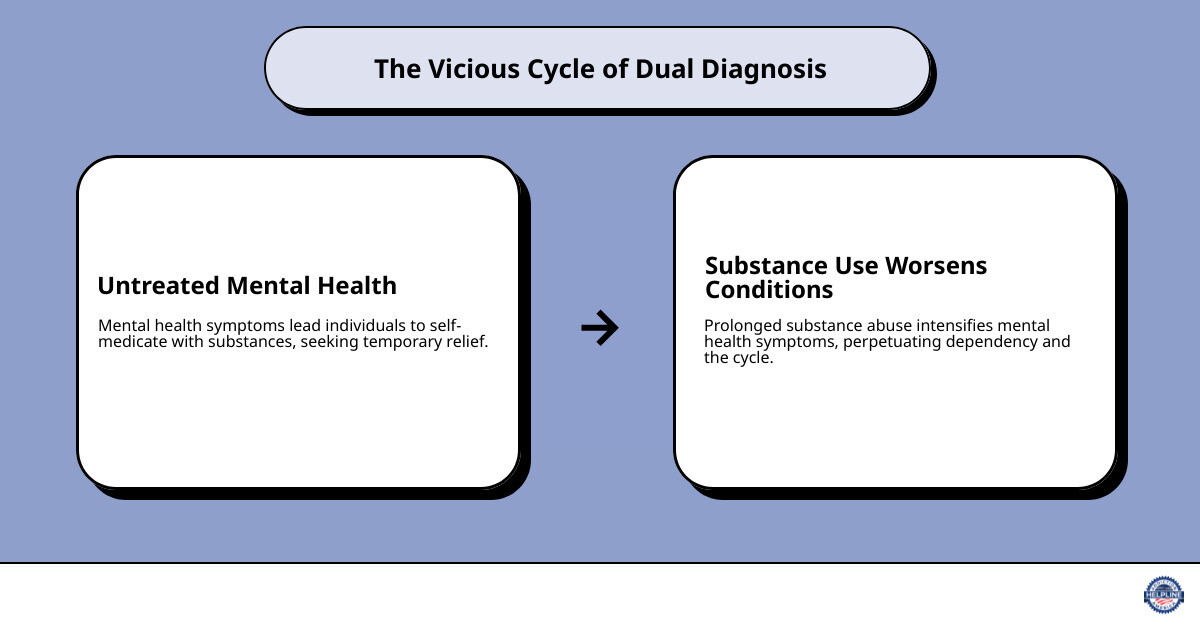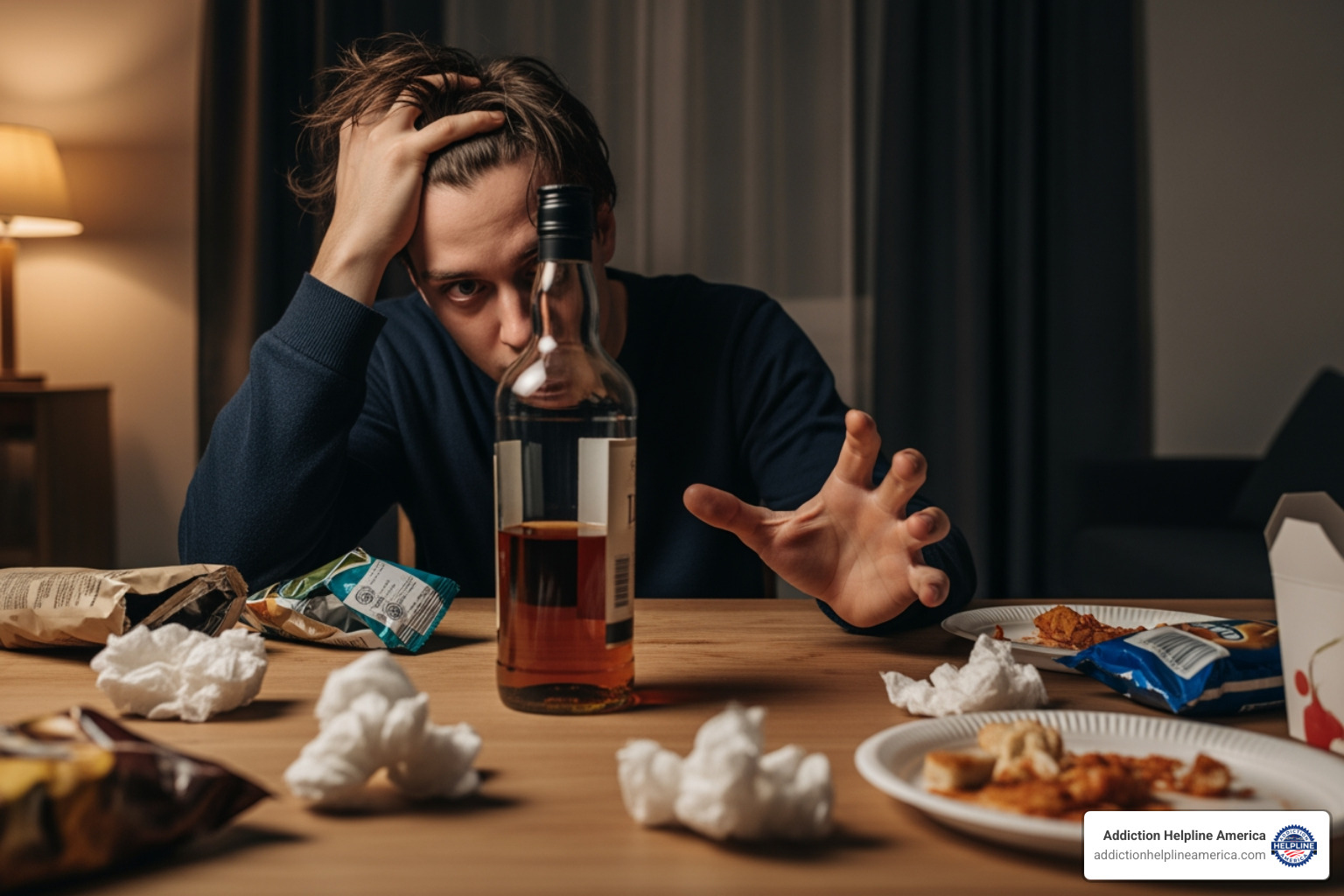
Understanding Dual Diagnosis and Why Los Angeles Residents Need Specialized Care

Dual diagnosis treatment LA provides specialized, integrated care for individuals facing both a substance use disorder and a mental health condition. This approach is critical because these issues are deeply intertwined. Untreated mental health problems can lead to self-medicating with drugs or alcohol, while substance use worsens conditions like depression, anxiety, and PTSD. This creates a vicious cycle that is difficult to break without professional, simultaneous treatment.
Quick Overview of Dual Diagnosis Treatment in Los Angeles:
- What it is: Simultaneous treatment of substance use and co-occurring mental health disorders.
- Common conditions: Depression, anxiety, bipolar disorder, PTSD, ADHD, and BPD.
- Treatment levels: Medical detox, residential, PHP, IOP, outpatient, and sober living.
- Key therapies: CBT, DBT, group/family therapy, medication management, and holistic approaches.
- Insurance: Most private insurance, Medi-Cal, and Medicare offer coverage.
In a high-stress environment like Los Angeles, the need for this specialized care is significant. However, not all rehabs are equipped to provide true integrated treatment, which requires a clinical team trained in both addiction and mental health. According to SAMHSA, millions of adults with co-occurring disorders go untreated each year.
At Addiction Helpline America, we connect people with comprehensive dual diagnosis treatment LA programs that offer the integrated care needed for lasting recovery. We’re here to guide you through the process of finding the right help.

Related content about Dual diagnosis treatment LA:
Understanding Dual Diagnosis and Its Importance
A dual diagnosis, also known as a co-occurring disorder, means experiencing a mental health disorder and a substance use disorder at the same time. These conditions are not separate issues; they are deeply interconnected and influence each other, making recovery challenging without integrated treatment.
Many people use drugs or alcohol to self-medicate the symptoms of anxiety, depression, or trauma. While this may offer temporary relief, it ultimately worsens the underlying mental health condition and can lead to addiction. According to SAMHSA, a significant portion of the millions of Americans with a substance use disorder also have a mental health condition.
Both addiction and mental illness affect the same areas of the brain responsible for pleasure, motivation, and stress response. This is why treating one condition while ignoring the other is rarely effective. Dual diagnosis treatment LA is designed to address both simultaneously, providing a path to sustainable recovery.
Call Now – Your Journey to Recovery Begins Today!

Take the first step towards a healthier life! Call now to connect with our compassionate team and start your recovery journey today. Your path to healing awaits!
Our recovery specialists are available 24/7 to provide support, and all calls are confidential and free. Reach out anytime – we’re here to help!
Common Co-Occurring Mental Health Disorders
Many mental health conditions can co-occur with substance use disorders. Effective treatment requires identifying and addressing these specific issues:
- Depression: Persistent sadness and loss of interest, often leading to self-medication.
- Anxiety Disorders: Including generalized anxiety, panic disorder, and social anxiety, where substances are used to calm nerves.
- Bipolar Disorder: Extreme mood swings between mania and depression, with high rates of co-occurring substance use.
- PTSD: Develops after trauma, with substances used to numb flashbacks and emotional pain.
- ADHD: Involves impulsivity and difficulty focusing, sometimes leading to misuse of stimulants or other drugs.
- Schizophrenia: A severe condition affecting perception of reality, where substances may be used to cope with symptoms.
- Borderline Personality Disorder (BPD): Characterized by intense emotions and unstable relationships, with substance use as a common coping mechanism.
The Vicious Cycle of Untreated Conditions

Untreated co-occurring disorders create a self-perpetuating cycle. Emotional pain from a mental health condition triggers cravings for substances as an escape. Substance use then provides temporary relief but ultimately worsens the mental health symptoms—for example, alcohol is a depressant that deepens depression over time. This decline in mental health drives more substance use, trapping the individual in a downward spiral.
Breaking this cycle is nearly impossible without addressing both issues. If the underlying mental health condition remains untreated after achieving sobriety, the risk of relapse is extremely high. Effective dual diagnosis treatment LA provides integrated care to treat the whole person, addressing the root causes of addiction and laying a foundation for lasting wellness.
How Integrated Dual Diagnosis Treatment Programs Work
The core principle of effective dual diagnosis treatment LA is integration: treating both the mental health disorder and the substance use disorder at the same time, in the same setting, by a unified team. This model is endorsed by leading organizations like NIDA and ASAM for its superior patient outcomes. You can watch a video on integrated treatment from SAMHSA to learn more.
The process begins with a comprehensive assessment by psychiatrists, psychologists, and addiction specialists to accurately diagnose all co-occurring conditions. This ensures the treatment plan addresses all aspects of your health.
If necessary, treatment starts with medically supervised detox to safely manage withdrawal symptoms. From there, an individualized treatment plan is created. There is no one-size-fits-all solution; your plan will be custom to your unique history, needs, and goals, using evidence-based therapies within a holistic philosophy that treats mind, body, and spirit.
Key Therapies and Modalities Used
Quality dual diagnosis programs use a range of proven therapies to build coping skills and promote healing:
- Cognitive Behavioral Therapy (CBT): Helps identify and change negative thought patterns and behaviors that fuel both addiction and mental health issues.
- Dialectical Behavior Therapy (DBT): Teaches skills for mindfulness, emotional regulation, and distress tolerance, particularly effective for conditions like BPD.
- Group and Family Therapy: Provides peer support, reduces isolation, and helps heal family dynamics damaged by addiction and mental illness.
- Medication Management: A board-certified psychiatrist evaluates if medications can help stabilize mood, reduce anxiety, or manage cravings.
- Trauma-Informed Care: Creates a safe environment that recognizes the role of past trauma in addiction and mental health struggles.
- Holistic Approaches: Includes practices like yoga, meditation, art therapy, and nutrition counseling to support overall wellness.
The Philosophy of Individualized Care

Effective treatment must be custom to your specific clinical needs, personal history, and recovery goals. The philosophy of individualized care moves beyond just treating symptoms to addressing root causes, such as underlying emotional pain or trauma. Therapies are selected based on what will be most effective for your unique combination of conditions. This patient-centered, strengths-based approach empowers you as an active participant in your healing journey. Research shows that this personalized, integrated treatment leads to higher recovery rates and more sustainable long-term wellness.
Call Now – Your Journey to Recovery Begins Today!

Take the first step towards a healthier life! Call now to connect with our compassionate team and start your recovery journey today. Your path to healing awaits!
Our recovery specialists are available 24/7 to provide support, and all calls are confidential and free. Reach out anytime – we’re here to help!
Finding the Right Dual Diagnosis Treatment in LA
With countless options in Los Angeles, finding the right dual diagnosis treatment LA center can feel overwhelming. The key is to look for a program with the specific expertise to treat co-occurring disorders simultaneously.
When evaluating centers, prioritize these essential qualities:
- Accreditation and Licensing: Look for accreditation from The Joint Commission or CARF, which signifies high standards for safety and care. Ensure the clinical team includes licensed psychiatrists, psychologists, and addiction counselors with dual diagnosis experience.
- Integrated Treatment Model: Confirm the program treats addiction and mental health together with one unified team and treatment plan, not as separate issues.
- Continuum of Care: A quality provider offers multiple levels of care—from detox and residential to outpatient programs—allowing you to transition smoothly as your needs change.
- Comprehensive Aftercare Planning: The best programs begin planning for your life after treatment from day one, providing resources for ongoing therapy, support groups, and relapse prevention.
- Family Involvement: Programs that include family therapy and education recognize that addiction impacts the entire family system and that loved ones play a key role in recovery.
Researching these factors is crucial but can be difficult during a crisis. Contact Addiction Helpline America for guidance to help you find a program that fits your specific needs.
Levels of Care for Dual Diagnosis Treatment LA
Quality programs offer a continuum of care to support you at every stage of recovery:
- Medical Detoxification: Safely manages withdrawal symptoms under 24/7 medical supervision.
- Residential Inpatient Treatment: A highly structured, 24/7 therapeutic environment, typically for 30-90 days, where you are removed from triggers.
- Partial Hospitalization Program (PHP): A step-down from residential, offering intensive daily treatment while you live at home or in sober living.
- Intensive Outpatient Program (IOP): Provides flexible but structured therapy for several hours a day, a few days a week, allowing you to integrate back into work or school.
- Standard Outpatient Care: Involves weekly therapy sessions for long-term maintenance and support.
- Sober Living Homes: Substance-free, supportive housing that bridges the gap between intensive treatment and independent living.
Essential Qualities of a Top-Tier Dual Diagnosis Treatment LA Center

A top-tier dual diagnosis treatment LA center is defined by its commitment to personalized, effective care. Beyond accreditation, look for a low staff-to-patient ratio, which ensures you receive the individual attention necessary for a custom treatment plan. The clinical team’s experience with complex co-occurring disorders is paramount. Finally, seek out programs with positive patient testimonials and strong aftercare support, including alumni programs. These elements indicate a center focused not just on short-term sobriety, but on your long-term wellness and success.
The Benefits and Path to Recovery
Choosing integrated dual diagnosis treatment LA is a decision for genuine, lasting change. This comprehensive approach treats the whole person, offering benefits that go far beyond sobriety.
Key benefits include:
- Improved Recovery Outcomes: By addressing the root causes of addiction, integrated care significantly reduces the risk of relapse and leads to more sustainable recovery.
- Reduced Stigma: Treatment provides a safe, non-judgmental space where addiction and mental illness are understood as medical conditions, not character flaws.
- Developing Coping Skills: Therapies like CBT and DBT provide a practical toolkit for managing triggers, regulating emotions, and handling stress without substances.
- Building a Sober Support Network: Through group therapy and peer support, you connect with others who understand your journey, reducing isolation and providing encouragement.
- Improved Quality of Life: The ultimate goal is not just survival, but a fulfilling life—rebuilding relationships, pursuing passions, and experiencing joy with clarity and purpose.
The Critical Role of Social Support
No one recovers alone. Social support is a vital component of lasting recovery. Peer support groups like AA, NA, or dual diagnosis-specific meetings offer a connection with people who truly understand the challenges. Family counseling helps heal relationships, educates loved ones, and turns them into allies in your recovery. Building healthy, supportive relationships is a key skill learned in treatment. For veterans, specialized resources like the Veterans Crisis Line provide confidential, custom assistance.
How to Get Started with Treatment
Taking the first step can feel daunting, but we are here to simplify the process.
- Initial Assessment: It starts with a confidential consultation to understand your unique situation, history, and goals. This helps determine the appropriate level of care.
- Verify Insurance Coverage: Most private insurance, Medi-Cal, and Medicare cover dual diagnosis treatment. We can help you verify your benefits and understand any out-of-pocket costs. Don’t let financial uncertainty be a barrier.
- Intake Process: Once you choose a program, you’ll complete an intake process involving paperwork and a more detailed evaluation to create your personalized treatment plan.
- Ask Questions: Advocate for yourself. Ask about treatment philosophy, staff credentials, and aftercare planning. A quality center will provide clear, honest answers.
Recovery is possible, and it can start today. Contact Addiction Helpline America for a confidential assessment and to explore your options. Our team is ready to help you find the right program and take that first step.
Frequently Asked Questions about Dual Diagnosis
Deciding on treatment is a big step, and it’s normal to have questions. Here are clear, straightforward answers to some common concerns about dual diagnosis treatment LA.
How does dual-diagnosis treatment differ from traditional rehab?
Traditional rehab was designed primarily to treat substance use, often overlooking co-occurring mental health conditions. Dual diagnosis treatment takes an integrated approach, recognizing that addiction and mental health are intertwined. In a dual diagnosis program, you receive psychiatric evaluations, specialized therapy for both conditions (like CBT or DBT), and coordinated medication management from a single, unified team. This method addresses the root causes of addiction, not just the symptoms, providing a much stronger foundation for lasting recovery.
Is dual-diagnosis treatment covered by insurance in California?
Yes, most insurance plans cover dual diagnosis treatment LA. The Mental Health Parity and Addiction Equity Act requires insurers to provide coverage for mental health and substance use disorders that is comparable to medical care. This includes private insurance, Medi-Cal (California’s Medicaid), and Medicare. However, coverage details like deductibles, co-pays, and in-network providers vary by plan. We recommend verifying your benefits beforehand, a service that Addiction Helpline America and our partner facilities can provide for free to clarify your costs.
Call Now – Your Journey to Recovery Begins Today!

Take the first step towards a healthier life! Call now to connect with our compassionate team and start your recovery journey today. Your path to healing awaits!
Our recovery specialists are available 24/7 to provide support, and all calls are confidential and free. Reach out anytime – we’re here to help!
How long does dual-diagnosis treatment last?
The length of treatment is personalized to your specific needs. There is no one-size-fits-all timeline. Residential programs typically last 30, 60, or 90 days, providing the time needed for stabilization and deep therapeutic work. Following this, outpatient programs (PHP or IOP) can last for several months, allowing for a gradual transition back to daily life. Recovery is a long-term process, and aftercare—including ongoing therapy and support groups—is a crucial component of maintaining wellness for years to come. The goal is to give you the time you need to heal thoroughly, not to rush through a program.
Conclusion
If you are struggling with both a substance use disorder and a mental health condition, know that recovery is possible. The key is finding integrated care that addresses both issues simultaneously. Traditional rehab often falls short by focusing only on addiction, leaving the underlying mental health triggers untreated.
Dual diagnosis treatment LA offers a comprehensive approach that treats you as a whole person. It combines psychiatric care, specialized therapy, and holistic practices to address the root causes of the addiction cycle. This path leads not just to sobriety, but to gaining insight, learning coping skills, and reclaiming a fulfilling life.
Taking the first step can be overwhelming, but you don’t have to do it alone. Addiction Helpline America exists to help you steer the treatment options in Los Angeles. Our compassionate team can answer your questions and connect you with a program that understands co-occurring disorders.
Don’t let another day go by feeling trapped. Hope begins with a decision. Find the right addiction treatment program for you and let us help you start your path to recovery today.
Our helpline is 100%
free & confidential
If you or someone you care about is struggling with drug or alcohol addiction, we can help you explore your recovery options. Don’t face this challenge alone—seek support from us.
Programs
Resources
Will my insurance
cover addiction
treatment?
We're ready to help
Find the best
drug or alcohol treatment
center
Are you or a loved one struggling with addiction? Call today to speak to a treatment expert.















